And So I Won NaNoWriMo 2018!
Every year, the NaNoWriMo, which stands for National Novel Writing Month takes place from November 1st, 12.00 am, to November 30rd, 11.59 pm. This annual challenge consists in writing a novel with a minimum of 50,000 words within the mentioned period, using both the language and the theme of our own choice.
How about the reward? Just the pleasure of having participated and having reached such a goal while abiding by the established rules. They are indeed people called “nano rebels” who, for instance, would start writing before November 1st. Others would start over an already started draft. Although cheating is technically permitted, it is at the discretion of the challengers but, in the end, people should really them oneself:
I wrote a full novel of 50,000 words within a month by respecting the rules.
In this post, I will tell you about my novel project, how the writing went and how I consider the future.
I am attracted to Japan
Among the people who know me quite well, the fact that I like Japan and its culture is not a secret. Nothing suprising, since we are quite a lot to love this country.
With this comes a taste for writing (maybe because I love programming?), another taste for martial arts (being a computer guy made de think about doing something for both my body and my mind) and a taste for history (being a programmer turns people into curious ones, I think).
This led me to getting intested in a period in Japan that is called Bakumatsu 「幕末」. Basically this ideogram means “end of goverment within the tent”, where “tent” here refers to the military one, the pavilion. We are talking about the end of a military dictatorship.
From 1853 to 1869, Japan went through a period of doubts, rebellions, skirmishes that led to the abdication of the military governor, also known as the shōgun 「将軍」. The power was given away to the Emperor, who just got a symbolic power (not political) since.
As regards little stories within this period, I was seized with emotion (I still am) when I found out that there was a group of young rōnin 「浪人」 — samurais without lord — who stood with the shōgun so they would protect him until the very end, as true samurais despite they hadn’t the title, while abyding by, thanks to a remarkable rectitude, the chivalry code that the japanese warriors were meant to respect: the bushidō 「武士道」. This group is called the shinsengumi 新選組」.
One of its proeminent members is called Hijikata Toshizō 土方歳三」. He was the vice-commander of this group. On his (french) wikipedia page, I read such an excerpt:
Dans un post-scriptum intéressant à propos de son implication dans la guerre du Boshin, l’officier français Jules Brunet fait l’éloge du vice-commandant Hijikata. Louant sa capacité de leader, il indique que s’il avait été en Europe, il aurait certainement été promu général. Source: https://fr.wikipedia.org/wiki/Hijikata_Toshiz%C5%8D
Basically we can translate this into:
In an interesting post-scriptum about his involvement into the Boshin War, the french officer Jules Brunet praised the vice-commander Hijikata. Lauding his leader skills, he mentionned that if he went in Europe, he would certainly be promoted as a general.
A french officer who acknowleged the merit of a Japanese. How beautiful it is!
Meanwhile I have learnt that Jules Brunet inspired the main character of the movie The Last Samurai and that Napoleon III sent Frenches to Japan in order to teach samurai to occidental warfare.
French people. To Japan. Who went with samurais.
I had to explore all of that. After a couple of journeys into Japan and some bibliographic search. The more I discovered, the more I was seduced by what I was learning.
I was nevertheless upset enough. Brunet was more famous in Japan than he was in France, in addition of being known thanks to a movie which barely inspired our beloved french officer. Although he did not make as “great” things as Jeanne d’Arc or De Gaulle did, I still told myself: what if I gave him some credit my way?
Now you know more about my attraction to Japan. Why did I want to write a novel?
“Art is the only thing that grants immortality.”
Writing a novel? ouch! Such a pain in the butt!
Firstly because it is a long-winded project. Secondly because, knowing me quite well, I never stay very long on the same project. I quickly get bored. It is a shortcoming of mines that I find it difficult to fix, despite my will to do so.
Writing a novel, it possibly means leaving a mark of our journey on Earth, into the little History; into the french national library’s collection. It means resisting against the preset order, against the global righteousness that makes us think we’re not capable, against the codes, the shame, the received opinion. It means resisting against the conclusion that we should stay into our routine already set.
Writing consists in feeding one’s mind. Like painting, playing music. It consists in expressing what we have deep in us through artistical detours of any kind.
Us people enjoy writing blog posts, a lot of technical stuff or a simple answer on forums. This does not look like a piece of work for sure, because we are passionate about what we do. This means a lot to me and probably to you.
Since it is hard for me to keep up with a lasting project, in addition of enjoying writing… I made a decision. I had to set out to write a novel. If other mates did it, why wouldn’t I, after all?
The NaNoWriMo was the appropriate time.
Getting started
So I was thinking something like: “I need do improve the France image and I want do romance a friendship between Jules Brunet the french officer and Hijikata Toshizō, notorious member of the shinsengumi.”
The History does not say much about their interactions. To be honests, it is very brief about what Brunet did in there. So I could take advantage of those areas of shadow.
During my research, I learnt that a French named Christian Polak had made some ineffable work on documenting relations between Frenches and Japaneses, as much as commercial ones than military ones.
As a matter of fact, did you know that a silk road existed between Lyon and Yokogama? Canuts needed japanese silkworms. Those were immune to some diseases the french ones were vulnerable to. If today Lyon is the capital of silk, well, it is thanks to Japan!
In a nutshell, the very first source of information I dug into was the Soie et Lumières book, from Christian Polak. I had to pay a visit to the french National Library for that.
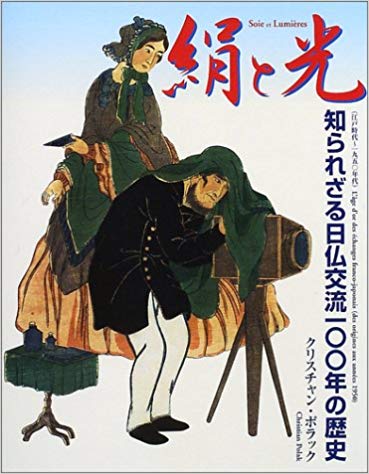
It this book, I learnt about the guidelines on how went the first french mission in Japan. I had a plan for my novel.
The source who helped me the most was nothing but L’engagement des officiers français dans la fin du shogunat et la restauration de Meiji (1867–1869) from Emmanuel Faubry. It consists of a more complete resource. This author made a quite amazing bibliography indeed, Christian Polak’s book included.
In France, the Defence Historical Service, whose short name is SHD for Service Historique de la Défense, contains military archive from the different army corps. In his ebook, Mr Faubry gave many references, folder numbers from the SHD which contain themselves a huge amount of handwritten mails from French people at the time in Japan.
See how the folder looks like:
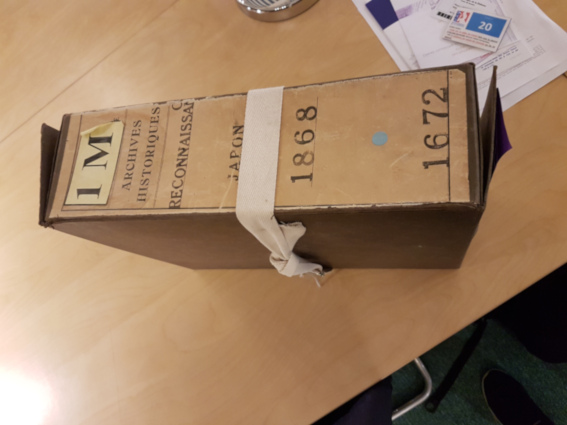
This board contains at least 150 years old handwritten notes, letters and reports. This is insane!
I wish I showed pictures of the letters, but I need a formal authorization from the SHD. Which I haven’t… I must say that these brave people demand a regular mail rather than an electronic one. Thus being said, I am not disappointed at all by the fact I physically went to the Château de Vincennes so I could visit the place.
I just had to review a few details as regard my novel: characters, scenes where they play, the main progress of my story, etc.
I spent the whole October month doing so, deliberately keeping myself away from hacking on a personal project. I did believe in this writing project!
How it went
50,000 words within 30 days, it is basically 1,667 words per day.
As in France November first is bank holiday (All Saints’ Day), I had some spare time to start writing my novel. I already knew that my prologue would deal with the well known Kinmon incident where Hijikata, fighting heart and soul with a saber, ascertains that fire weapons and artillery are more efficient to shed numerous opponents.
It lets me launch the great question of the novel: is it the end of the chivalry and fencers?
Anyway I won’t spoil anything. Just notice that I wrote this first scene from midnight until 3.00 am, something?
Since November 1st was a Thursday and that the day after was bank holiday as well, I had four days in a row (with my week-end) to write as much as I could. As regard the NaNoWriMo, the goal is quantity, not quality. One must write without correcting straight away. I’m not speaking about bits and pieces like typo; mostly about turns of phrases, paragraph to review, etc. This would be a major piece of work that would came aftermath…
Since quantity took precedence over anything else, I managed to write around 5,000 words in a row. All of this with my actual lazyness, my lack of imagination and motivation as regard a few scenes, reordering scenes from my plan, breaks to get some fresh air, and so on.
I realized that I most enjoyed writing dialogues rather than describing stuff. I admitted then that I had to improve the latter point. Doing the NaNoWriMo is indeed a great occasion to discorver oneself, bringing to light our own strenghts and weaknesses.
Not to forgot my entourage cheering me up. This is something that helped me a lot. Without mentioning the other people doing the NaNoWriMo with whom I share a common goal as much as emotions, fears, questionings and so forth. I even asked to be sponsored by a NaNoWriMo veteran just in case. This helped me notice that I was in the correct way to go.
I also noticed that I could have planned my novel much better. I had to review a few historical details, which helped me to have a deeper insight on a few details of the history until some of the anecdotes. In my opinion this is a most positive contribution to my experience.
I reached my goal within 11 days. My final draft is around 60,000 words lenght. I finished it in two weeks, thanks to an orthogonal keyboard with a bépo layout (french dvorak variant) which I started using a few months earlier. Here is what it looks like:
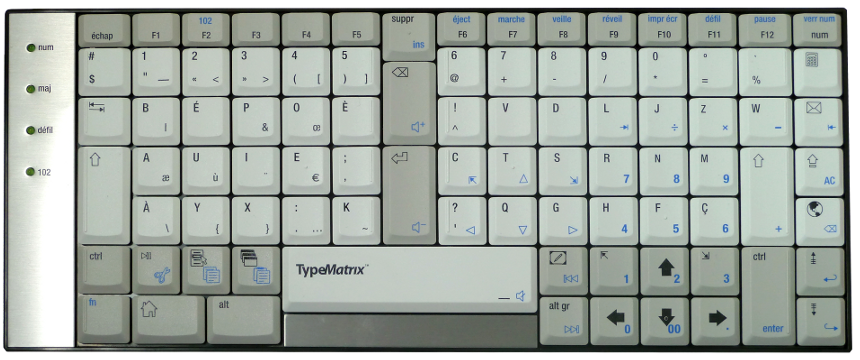
Let me warn you about it. This is a double investment:
- the keyboard price is quite high (around a hundred euros);
- I had to learn from scratch another keyboard layout.
I am so happy with it! Still I make typing mistakes for sure, but getting used to new habits was quick since I chosed not to use an old qwerty keyboard anymore.
In the end: I wrote around 60,000 words to relate the twists of a French who, once he landed to Japan, instructed young japanese people with european warfare and fell in love with the country so he quited the french army to help a rebellion in the North of the country, against the imperial army so they would not rule all of the Japan islands.
What is next?
Phew! I feel like doing a shit ton of things but if there is one I don’t feel like doing at the moment, it’s remastering my novel. Why is that?
I have to admit I am lazy. Sometimes I easily give up against difficulty. I nevertheless mentioned that I shall work on that, though!
To be honest, facing such a difficulty while driving a big project cheered my up writing 60,000 words. Sooner or later, I shall achieved my artwork — well, if we can say this is artwork…
In between it made me feel like learning back japanese! I also discovered that a Japanese authored a novel on Jules Brunet as well! The book is entitled ラ・ミッション」 which can be litteraly read “la mission” in French, translatable into “the mission” in english.
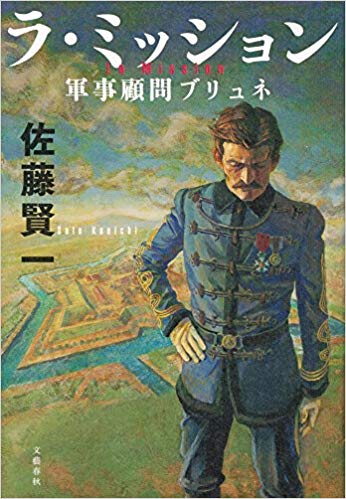
On the cover, there is a drawing of Jules Brunet.
You guess I’d die reading it. Hence my will to take on my self study of the japanese language. The end justifies the means.
By the way, do you want to know what did Jules Brunet look like? You can find it out on the picture bolow. I barely circled him in red.
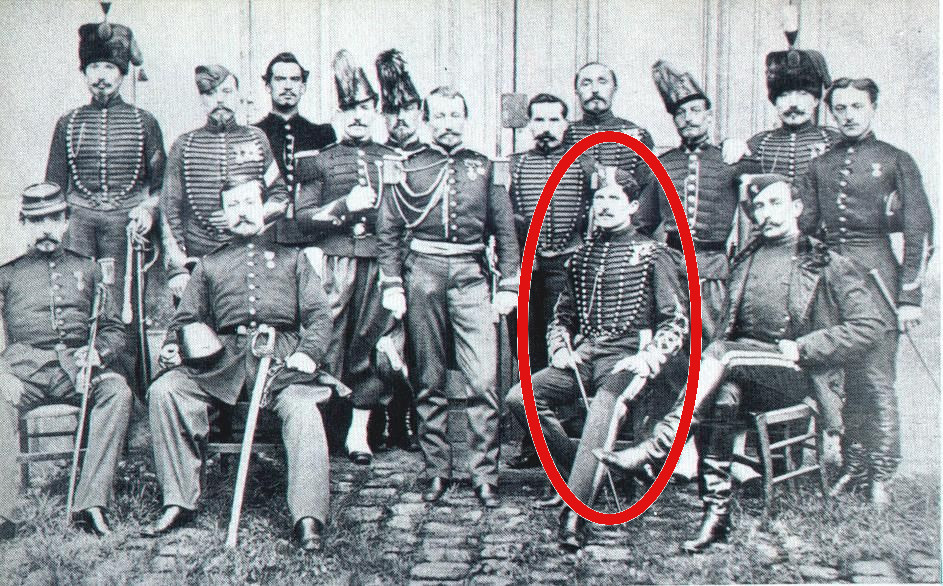
I want to do the next NaNoWriMo with other ideas:
- telling an alternative story to my novel, from the opponents point of view;
- writing a novel in a foreign language (english, esperanto, japanese…);
- trying out sci-fi;
- using constrained writing.
I don’t lack of ideas!
Once I shall be back on my feet, I’ll try to (self?) publish my novel on Brunet.
Final words
So the 2018 NaNoWriMo edition is over. It was a great experience I recommend to everyone.
I feel a bit ashamed of my draft and though it is in French, I will let you have a look if you are pleased to do so: https://github.com/Ge0/un-petale-dans-la-braise
I indeed used github to save my work even though it does not really fits. I am a computer dude for ever.
Do not forget that as this time I write these lines, I did not correct anything in my draft. So there are typos, complex turns of sentences and scenes to remaster.
Thank for having read this post. I’ll end up with this blurb:
Jules Brunet est un jeune Français accompli : diplômé de l’École polytechnique avec des résultats brillants, son début de carrière militaire est prometteur. Son parcours semble tout tracé, au vu de ses nombreux atouts et de ses exploits passés.
Seconde moitié du XIXe siècle : appelé par le ministre de la Guerre dans le cadre d’une mission militaire au Japon, Brunet et ses camarades sont missionnés afin de moderniser l’armée nippone. Le contexte est délicat et la guerre civile sévit. La course à l’armement tient en haleine le gouverneur militaire du Japon, en proie au renversement par les partisans de l’Empereur.
Sur place, Brunet va nourrir un intérêt et un amour démesurés pour une culture dont il ne semblait estimer la profondeur. Cet homme du monde, archétype du parfait soldat du Second Empire, saura-t-il tirer parti de ses innombrables qualités au service des deux pays ?
See you next year!